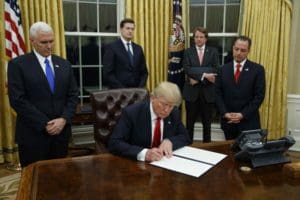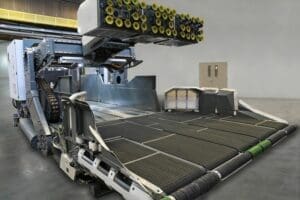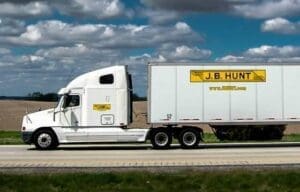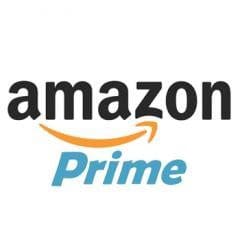 This Sunday is Mother’s Day, a day to celebrate moms everywhere. According the NRF’s annual look into Mother’s Day spending, an estimated 84 percent of consumers are planning gift purchases for their mothers (or wives). And like most holiday spending trends, Mother’s Day spending has consistently grown over the last decade. And in 2019, consumers will once again set an all-time high, with total spending approaching $25 billion, up from $23.1 billion last year. The three most popular gift ideas this year are greeting cards (75 percent of consumers plan to purchase), flowers (67 percent), and special outings (55 percent). An area of growth is the personal service gift, which has grown from 16 percent to 25 percent in the last decade. These gifts account for nearly $2 billion in Mother’s Day spending. So happy Mother’s Day to all the moms out there. And now, on t this week’s logistics news.
This Sunday is Mother’s Day, a day to celebrate moms everywhere. According the NRF’s annual look into Mother’s Day spending, an estimated 84 percent of consumers are planning gift purchases for their mothers (or wives). And like most holiday spending trends, Mother’s Day spending has consistently grown over the last decade. And in 2019, consumers will once again set an all-time high, with total spending approaching $25 billion, up from $23.1 billion last year. The three most popular gift ideas this year are greeting cards (75 percent of consumers plan to purchase), flowers (67 percent), and special outings (55 percent). An area of growth is the personal service gift, which has grown from 16 percent to 25 percent in the last decade. These gifts account for nearly $2 billion in Mother’s Day spending. So happy Mother’s Day to all the moms out there. And now, on t this week’s logistics news.
- Dow, stocks fall as China-US trade talks continue
- Nestlé in the news:
- Robots edge closer to unloading trucks
- Panter & Tourron releases line of flat- pack, easy to assemble furniture
- B. Hunt the latest to deploy drop-and-hook trailer pool program
- Amazon can already ship to 72 percent of US population within a day
 Stocks continued to slide during midday trading yesterday as the US and China resumed trade talks. Earlier this week, President Trump tweeted that he would increase duties on $200 billion of Chinese imports to 25 percent from the current 10 percent. Additionally, Trump threatened a 25 percent tariff on more than $325 billion of goods that are currently untaxed. Not one to back down, China’s Commerce Ministry followed up on Thursday with a statement saying the country would impose “necessary countermeasures” if higher tariffs that Trump threatened are enacted on Friday. The talks were originally scheduled for Wednesday but will take place on Thursday and Friday instead. Let’s see if we have any updates later in the day on this one.
Stocks continued to slide during midday trading yesterday as the US and China resumed trade talks. Earlier this week, President Trump tweeted that he would increase duties on $200 billion of Chinese imports to 25 percent from the current 10 percent. Additionally, Trump threatened a 25 percent tariff on more than $325 billion of goods that are currently untaxed. Not one to back down, China’s Commerce Ministry followed up on Thursday with a statement saying the country would impose “necessary countermeasures” if higher tariffs that Trump threatened are enacted on Friday. The talks were originally scheduled for Wednesday but will take place on Thursday and Friday instead. Let’s see if we have any updates later in the day on this one.
 Nestlé announced earlier this week that more than three-quarters (77 percent) of its agricultural commodities are verified as deforestation-free. The company has been vocal about its efforts since making a no-deforestation commitment in 2010 to ensure that none of its products globally would be associated with deforestation by 2020. The company is using a combination of tools, including certification, supply chain mapping, on-the-ground verification, and satellite imagery from the Starling system to achieve this goal. Additionally, Nestlé has worked with suppliers and partners to identify areas that were at risk of deforestation and make specific plans for how to mitigate the threat.
Nestlé announced earlier this week that more than three-quarters (77 percent) of its agricultural commodities are verified as deforestation-free. The company has been vocal about its efforts since making a no-deforestation commitment in 2010 to ensure that none of its products globally would be associated with deforestation by 2020. The company is using a combination of tools, including certification, supply chain mapping, on-the-ground verification, and satellite imagery from the Starling system to achieve this goal. Additionally, Nestlé has worked with suppliers and partners to identify areas that were at risk of deforestation and make specific plans for how to mitigate the threat.
Nestlé is also making news around a decision to change the way it delivers frozen pizza and ice cream to stores. The company plans to eliminate direct-store delivery of these two items in the US, a move which will eliminate 4,000 jobs. The company is moving from direct-store delivery to using its network of warehouses it already uses for frozen meals and snacks. Nestlé will close 8 company-owned frozen distribution centers and frozen inventory transfer points, a move that will make for a one-time cost of about $500 million, and a one-time negative sales impact of about $450 million. However, the company insists that the new model will be both more efficient and profitable in the long run.
 Warehouses have been increasing the use of robots and automation to make operations faster and more efficient. However, one area that has not seen much success is the loading and unloading of trucks. Siemens AG and Honeywell International are both getting close to clearing this hurdle. The two companies have built machines that pull packages from the back of a tractor-trailer and place them on conveyor belts, sending the parcels into the warehouse for sorting. Even with these advancements, challenges still abound. Both machines require quite a bit of space to house and operate, and warehouses are already near capacity. The Siemens robot also requires modifications to the truck’s trailer. While the Honeywell machine does not require modifications, it is not as fast at unloading. Either way, these two machines are certainly a step in the right direction for automating the unloading of trailers.
Warehouses have been increasing the use of robots and automation to make operations faster and more efficient. However, one area that has not seen much success is the loading and unloading of trucks. Siemens AG and Honeywell International are both getting close to clearing this hurdle. The two companies have built machines that pull packages from the back of a tractor-trailer and place them on conveyor belts, sending the parcels into the warehouse for sorting. Even with these advancements, challenges still abound. Both machines require quite a bit of space to house and operate, and warehouses are already near capacity. The Siemens robot also requires modifications to the truck’s trailer. While the Honeywell machine does not require modifications, it is not as fast at unloading. Either way, these two machines are certainly a step in the right direction for automating the unloading of trailers.
 More and more companies are trying to create flat-packing, easy to assemble and disassemble furniture geared towards those people that tend to move often. Panter & Tourron’s furniture concept goes even more minimalistic, with the entire collecting fitting into a car. The company has designed couches and chairs that pack flat, making shipping, delivery, or just bring the item home significantly easier. The pieces also do not require any tools for assembly; instead they use tension to hold them together. The materials are also durable, meaning that people will be more likely to disassemble the furniture and take it with them. Each piece can be manufactured without complex machinery and can be made locally to help shrink the initial shipping distance.
More and more companies are trying to create flat-packing, easy to assemble and disassemble furniture geared towards those people that tend to move often. Panter & Tourron’s furniture concept goes even more minimalistic, with the entire collecting fitting into a car. The company has designed couches and chairs that pack flat, making shipping, delivery, or just bring the item home significantly easier. The pieces also do not require any tools for assembly; instead they use tension to hold them together. The materials are also durable, meaning that people will be more likely to disassemble the furniture and take it with them. Each piece can be manufactured without complex machinery and can be made locally to help shrink the initial shipping distance.
 J.B. Hunt announced earlier this week a new trailer pool program designed to increase access to drop-and-hook freight. Dubbed the 360box, J.B. Hunt’s platform is the third such program to launch in the past year. The program will introduce a pool of 500 additional 53-foot trailers that businesses can reserve for drop trailer purposes. Carriers will make offers to transport the trailers using Carrier 360 by J.B. Hunt, the company’s digital freight matching platform. The program eliminates the need for drivers to wait for a dock door to load or unload the trailer; instead, they can simply drop the trailer in a designated area and go on to their next load.
J.B. Hunt announced earlier this week a new trailer pool program designed to increase access to drop-and-hook freight. Dubbed the 360box, J.B. Hunt’s platform is the third such program to launch in the past year. The program will introduce a pool of 500 additional 53-foot trailers that businesses can reserve for drop trailer purposes. Carriers will make offers to transport the trailers using Carrier 360 by J.B. Hunt, the company’s digital freight matching platform. The program eliminates the need for drivers to wait for a dock door to load or unload the trailer; instead, they can simply drop the trailer in a designated area and go on to their next load.
 Last week I wrote that Amazon was ready to launch one-day shipping for all Prime members. With $800 million invested in the initiative, it’s not surprising to see that the company has already expanded its delivery network to be ready for the launch. According to a study by RBC Capital Markets, Amazon is already capable of offering same-day and one-day shipping to 72 percent of the US population, including 95 percent or more in the 16 of the wealthiest and most populated states. The quicker Amazon is able to ship an item to a house, the more likely it is that customers will opt for the convenience of delivery over going to a store.
Last week I wrote that Amazon was ready to launch one-day shipping for all Prime members. With $800 million invested in the initiative, it’s not surprising to see that the company has already expanded its delivery network to be ready for the launch. According to a study by RBC Capital Markets, Amazon is already capable of offering same-day and one-day shipping to 72 percent of the US population, including 95 percent or more in the 16 of the wealthiest and most populated states. The quicker Amazon is able to ship an item to a house, the more likely it is that customers will opt for the convenience of delivery over going to a store.
That’s all for this week. Enjoy the weekend and the song of the week, Mother by Pink Floyd.

















